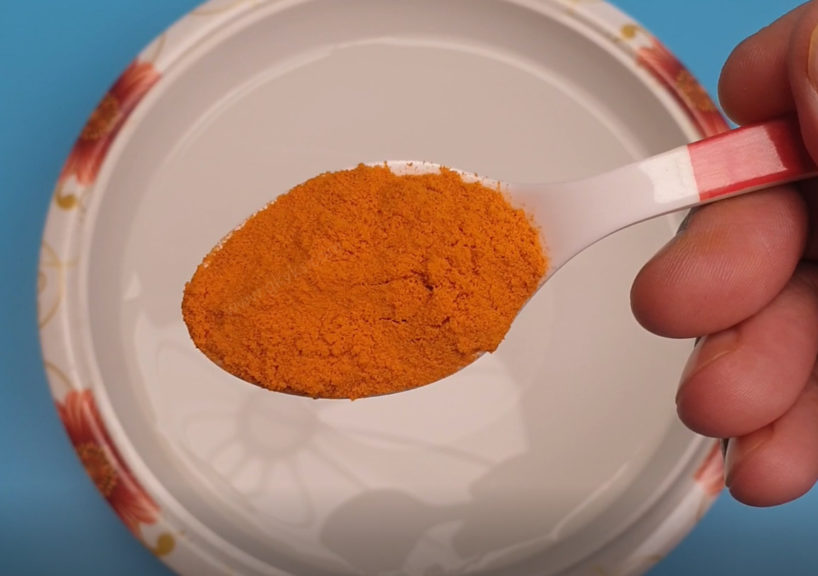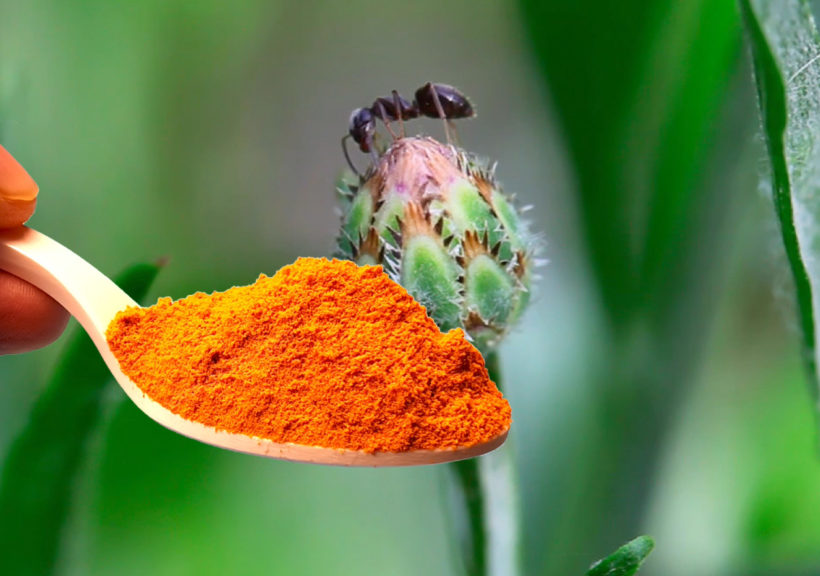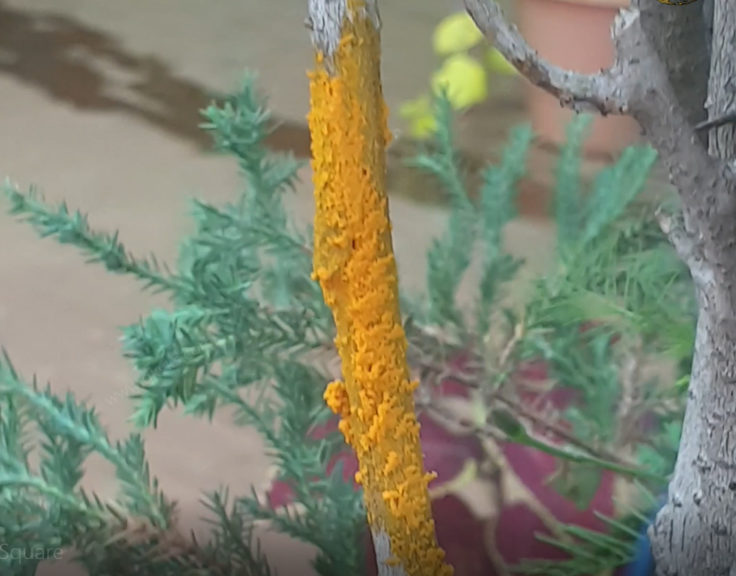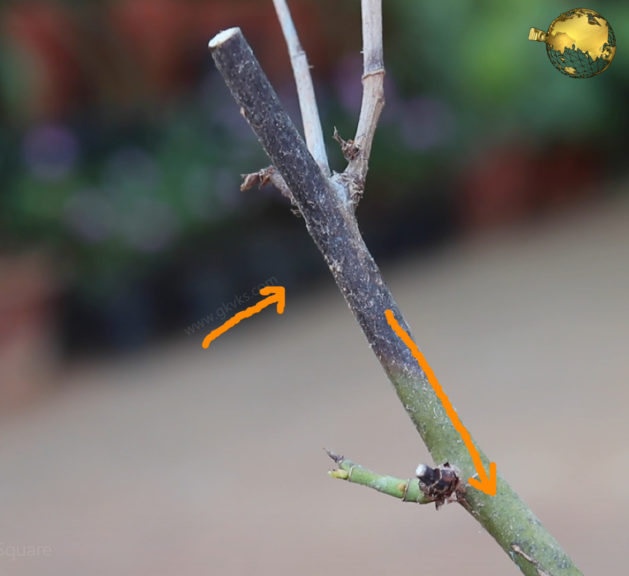First and foremost, please avoid the use of chemical pesticides and fertilizers which have a lot of hazardous effects on humans and animals. That’s the main reason, why we promote the use of natural agents in this gardening portal.

Turmeric rhizome contains a substance called Curcumin, which is a very potent antioxidant, has antimicrobial, anti-inflammatory, hepatoprotective effects, and it is very beneficial in boosting the immune system of our body. Turmeric is not only good for the human body but also has some amazing benefits in the garden. You can easily grow turmeric plant from a small piece of turmeric rhizome and harvest a lot of turmeric.
- ANT REPELLANT: Sometimes Ants, especially if there are lots of them, can be a menace to your garden. They seem to be particularly sensitive to turmeric’s strong odor.

- How to Use Turmeric to Get rid of Ants? Simply sprinkle turmeric powder around your plants and even over the surface of the soil. Just few pinches and not too much. This can repel ants and help you get rid of these unwanted visitors in your garden, which can sometimes pose a serious threat by carrying mealybugs to the growing ends of plants. Yes! Mealybugs and ants have a symbiotic relationship. Ants carry mealybugs to growing ends of plants in exchange for the honeydew excreted out of their anus. So, Ant control means mealybug control.
- SOIL PEST CONTROL: You can get rid of soil pests particularly fungal root rot and fungus gnats in the soil by mixing turmeric in soil. You can mix about 1 tablespoon per gallon of soil while making your potting mix or whenever you repot your plant. Remember, adding too much of it can have negative impact on the beneficial soil microbes. The other method to use for plants that cannot be repotted, is mixing 1 tablespoon of turmeric in 1 gallon of water or 1 teaspoon per liter of water and thoroughly water your affected plant with this solution. We will shortly discuss on how to make a powerful pesticide spray using turmeric. Please watch it till the end.
- HEALING TREE WOUNDS: Similar to humans, open wounds or injuries in plants, can make them susceptible to different kinds of diseases and infections, particularly fungal rot. Due to its natural antiseptic and antibacterial properties, turmeric is also a natural remedy to heal various types of plant wounds. You can make a turmeric paste and apply over the wound to save the plant. This also helps in plant stem or branch fractures. You apply the paste and tie a polythene or grafting tape to save the plant. This turmeric treatment is also commonly used after pruning tree branches to cut wounds, also used in grafting, and any other similar situations when the plant becomes exposed to external damaging factors.

- TO TREAT ROSE DIE BACK DISEASE: Rose dieback is a condition commonly affecting rose plants where there is browning or blackening of the tip of the rose stem or a branch which then travels down toward the graft and may engulf the whole plant causing death. It can either be a Branch die back or the main stem dieback towards the graft. It is in fact a commonly encountered problem by every gardener and can sometimes be too bad causing death of the plant if no intervention is done. Though, the main treatment of Dieback disease is pruning the involved stem or branch, applying turmeric paste over the wound after pruning helps prevent progression of Rose dieback disease.

- AS A ROOTING AGENT: Though not a rooting hormone, turmeric can be used to increase the chances of rooting plant cuttings. This is mainly because of its anti-microbial and anti-fungal effects.
- PESTICIDE SPRAY: Turmeric alone as a spray can be used to treat few fungal plant diseases and pests like powdery mildew and other fungal spots. But it is not effective against pests like mealybugs, aphids, mites and other pests. For minor fungal spots and powdery mildew, you can mix 2 tea spoons of turmeric powder in 1 litre of water and spray on the affected plant.
Though there is no substitute to neem oil for pest control, you can make a powerful and broad-spectrum pesticide using turmeric and other stuff, especially if neem oil is not available in your location. You need to mix other stuff depending on what you want to treat.
- For Powdery mildew, you can mix 2 teaspoon of Turmeric powder, 100 ml of milk and 2 teaspoons of distilled white vinegar to 1 litre of water and spray on the affected plant. This is the most powerful natural remedy to treat powdery mildew.
- If Neem Oil is not Working on Certain Pests: You can add Turmeric and Garlic to neem oil solution if the pests are resistant to neem oil. You mix 5 to 10 ml neem oil in 1 litre of water and add 1 – 2 teaspoons of turmeric powder or even fresh turmeric rhizome and then add 4 to 5 cloves of crushed garlic to this mixture and sieve it fine to avoid clogging of spray bottle. Spray this once weekly. Patch test on a leaf may be important, depending on the concentration of your neem oil brand.
Have you noticed, how plants suddenly look greener during rainy season? One of the reasons is hydrogen peroxide found in small amounts naturally in rain water.
Although Hydrogen Peroxide is a chemical, but it easily decomposes to water and oxygen, and hence safe to be used even in organic gardening in varying dilutions. It is a colourless and odourless liquid and a commonly used medical and household disinfectant.
Now, the Concept for using Hydrogen peroxide in garden: It has a chemical formula H2O2 similar to that of water, but with an extra oxygen atom. This concept of additional oxygen release when hydrogen peroxide breaks down is the key to its beneficial effects in gardening.
Well, before we list out the top 10 benefits of hydro gen peroxide in garden, you must be aware of what concentration to purchase from the medical stores. It’s very inexpensive and commonly available in 3%, 6% and sometimes 35%. We will be using 3% or 6% hydrogen peroxide in our garden. Please watch this video till the end!
10. Save a Dying Plant: Applying the concept of extra oxygen atom release, we can revive a dying plant with hydrogen peroxide. First Check by scratching the stem, if its green and juicy, then it can be revived. Cut off all the dead branches and stem till the viability zone or the green zone. Take out the plant by its roots. Inspect the roots for any rot. Prepare a diluted hydrogen peroxide solution using 3% or 6%. Use 2-3 teaspoons of 3% peroxide per litre or 2 tablespoons per gallon of water. If you are using 6%, the dosage is half of this. Now soak the roots into this solution for about 6 hours. Then repot this in a clean fresh potting mix and new container. Water this with the same solution and leave it alone in shade for few days. Water the plant only when 1 or 2 inches of top soil dries out completely. You can repeat watering with this solution till it begins to show signs of life.
9. Accelerate Seed Germination: Seeds soaked in diluted hydrogen peroxide germinate faster and display healthy growth in future. Since the oxygen requirement of sprouting seeds is very high, this extra oxygen supply is obviously beneficial. You can soak seeds in a solution with 1-2 teaspoons of 3% peroxide per litre of water or water the seedling tray of seeds are already planted. This also takes care of any seed borne pathogens and helps in better root development of the seedlings.
8. Disinfecting Garden tools: especially the cutting and pruning tools should be disinfected while taking plant cuttings for rooting or cloning your plants. You can use 6% h2o2 solution to wipe off the cutting tool with a cotton or dip the tool into the solution for few minutes. This increases the chances of a high success rate in growing plants from cuttings.
7. Disinfect Seed Germination Trays: for a high success rate in germination your seed trays have to be free from pathogenic microorganisms. You can wipe them with 6% solution without any dilution.
6. Treat Fungal or Bacterial Root Rot: Overwatering can cause a shortage of oxygen at the roots. By filling the air pockets found in the soil around your plants, suffocating the roots of the plant. This lack of air causes the plants to start dying due to root rot. To treat this problem, you can water them with a mixture of two to three teaspoons of 3 percent hydrogen peroxide per litre of water or 2 tablespoons per gallon of water. The extra oxygen found in the hydrogen peroxide delivers the much-needed oxygen to the plant’s roots. After applying this solution to your plants avoid watering again until the top two inches of the soil is completely dried.
5. To Sterilize the Seed Starting Mix for better success in seed germinations. Add a 1:3 dilution of 3% h2o2 in water to the seed starting mix and leave it over night before using the soil or mix for seed sowing. You can also sprinkle this on your potting mix to disinfect your potting soil.
4. Weed Killer: At 10% or higher concentration of hydrogen peroxide, it completely destroys all types of vegetation it comes in contact with. But use it with caution around your plants. This is best applicable for cracks and crevices.
3. As a Fertilizer: Water your plants with a very dilute solution of hydrogen peroxide once in a month for the rain effect. You can add 1 teaspoon per litre of 3% hydrogen peroxide or 1 table spoon per gallon of water and water your plants to supply oxygen to the roots.
2. In hydroponic or aquaponics system: the addition of hydrogen peroxide to the water will keep the plants healthy. The roots of plants, as well as the aquatic life, appreciate the extra supply of oxygen.
1. EFFECTIVE PESTICIDE AND ANTI FUNGAL: It can control many common pests and insects in garden, mainly the sap sucking pests like aphids, mites and mealybugs. It can kill the eggs and larvae of moths and other harmful pests with its strong oxidizing effect. To make this pesticide, use 1 cup that’s about 250 ml of 6% hydrogen peroxide per litre of water or 2 cups of 3% h2o2 per litre of water. Load it in a spray bottle and spray on the plants. To control Fungus gnats and soil pests, you can water the plant with the same solution. It can also used in the treatment of mold and powdery mildew fungus.
Technically, Aspirin is not an organic solution, however, it is a safe and very inexpensive option that contains far fewer chemicals than the store-bought chemical products for gardening. I think most of us might have exhausted their regular pesticide stocks during this lockdown period, especially the great neem oil. Do not worry and watch this video till the end.
Aspirin is chemically Acetyl Salicylic Acid and medically a non-steroidal analgesic and anti-inflammatory medicine, inexpensive and easily available in almost all medical stores.
So, what is the actual concept behind using Aspirin in gardening and farming. Salicylic acid is naturally found in willow bark and many other trees. Studies have found that the plant hormone salicylic acid is released in tiny amounts when plants are in stress. So this concept has been utilized and many benefits of Aspirin have already been proven. Here we are using Aspirin 350 mg dispersible tablet – brand names like Disprin, Ecospirin, Bayer Aspirin and so on. If you are not getting a dispersible tablet, you can crush the non-dispersible tablet and powder it and use it.
- Aspirin for Plant growth: Many university research studies have been conducted on this. They sprayed plants with an aspirin water once every three weeks for the course of an entire growing season and found that, the plants sprayed with the aspirin solution were found much bigger and had more fruits and flowers than their counterparts.
So, How to use Aspirin in your garden? You can dissolve one tablet of aspirin in one gallon of water and drench your plants with this solution once in a month. You can spray this solution on the leaves and also water your plants with this water. This enhances the immune system of plants and helps them in combating with pests and microbial attacks and prevents the formation of fungus leading to increased growth of plants and improves the overall health if your plants. - Aspirin Improves Seed Germination: A low dose of aspirin water significantly improves seed germination and in one study the plants treated with the aspirin water had a 100 percent germination rate, while the plants that weren’t treated had more inconsistent results. To make this solution or spray, drop half a tablet of a 350 mg Aspirin per gallon of water or a quarter tablet per litre of water and stir well. One method is to Spray on the seeds already planted and another method is to soak the seeds in this solution for 1 to 2 hours before planting them.
- Aspirin as a Rooting Hormone: As already discussed, Salicylic acid is naturally found in willow bark and many other trees. Willow bark extract is being used since ages as a Rooting agent to clone plant cuttings successfully. If you do not have rooting hormone powders like naphthalene acetic acid and indole butyric acid, you can use aspirin for this job.
Take one teaspoon of cinnamon powder from your kitchen and add it to 1 litre of lukewarm water and then drop in half a tablet of 350mg aspirin and stir it well. Then dip the cuttings into this solutions for about 30 to 60 minutes and then plant those cuttings into soil. If you are trying to root cuttings in water, drop half a tablet of aspirin per litre of water. If you are changing this water, you need to again add half a tablet of aspirin into the container till rooting starts.
- Aspirin as an anti fungal to treat Blight in plants: Blight means a specific symptom affecting some plants like tomatoes and peppers due to infections by pathogenic microrganisms, leading to rapid and complete chlorosis, browning, then death of plant tissues started from leaves, branches, flowers and fruits. The dosage is same, that is one tablet per gallon of water as a spray or drench your plant with this water.
- To keep Cut flowers stay fresh for a longer time: Put a 1/4th tablet of aspirin in a vase with fresh cut flowers from your garden to help them stay fresh longer. If the vase is larger add half a tablet.
Now! The PESTICIDE RECIPE:
– Take a Large Onion and drop it into a kitchen blender
– Add 4 fresh cloves of garlic into this.
– Add 2 teaspoons of Red Chilli Powder.
– Add 1 teaspoon of Cinnamon Powder.
– Blend this into a fine paste by adding some water.
– Now Add about 2 Cups of Water to this and mix well and allow it to steep overnight.
– Then in the morning, strain out the liquid using a nylon cloth or a fine sieve to get your pesticide concentrate. You can even store this concentrate in refrigerator.
– To Apply as pesticide, Use it in 1:5 dilution in water. That is to one cup of this pesticide add 5 cups of water and most importantly do not forget to add some 10 drops of liquid detergent soap for the surfactant effect and to coat the leaves and retain the pesticide effect for longer time. Use this twice weekly until all pests are eradicated. This will successfully kill common pests like aphids, mealybugs, whiteflies and many others.
